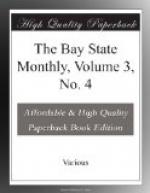In 1870, he was married to Miss Mary W. Glover of Hingham, Massachusetts, to which town he had previously removed his residence. During his executive administration, he had the great misfortune to undergo bereavement by the loss of this most estimable lady, whose wise counsel often lent him encouragement in the perplexed days of his official life.
In 1875, Mr. Long was chosen to represent the Republicans of the second Plymouth District in the legislature. He at once took a prominent position, and gained great popularity with his fellow members. In 1876, he was re-elected to the House, and soon after he was chosen speaker. This position he filled with dignity, grace, and with an ease surpassed by no speaker before him or since. He showed himself thoroughly versed in parliamentary practice, and his tact was indeed something remarkable. So great was his popularity that, in 1877, he had every vote which was cast for speaker, and in the following year every vote but six.
In the fall of 1877, the Republican State Convention assembled at Worcester, and it at once became apparent that many of the delegates were desirous to vote for Mr. Speaker Long for the highest office in the Commonwealth. At the convention he received, however, only 217 votes for candidate; and his name was then withdrawn. At the convention of 1878, he again found numerous supporters, and received 266 votes for Governor. He was then nominated for Lieutenant Governor by a very large majority, and was elected. In the convention of 1879, Governor Thomas Talbot declining a re-nomination, Lieutenant Governor Long received 669 votes to 505 votes for the Hon. Henry L. Pierce, and was nominated and elected, having 122,751 votes to 109,149 for General Benjamin F. Butler, 9,989 for John Quincy Adams, and 1,635 for the Rev D.C. Eddy, D.D.
On the fifteenth of September, 1880, Governor Long was re-nominated by acclamation, and in November he was re-elected by a plurality of about 52,000 votes,—the largest plurality given for any candidate for the governorship of Massachusetts since the presidential year of 1872. He continued to hold the office, by re-election until January, 1883.
Several important acts were passed during the administration of Governor Long, and notably among these was an act fixing the penalties for drunkeness,—an act providing that no person who has been served in the United State army or navy, and has been honorably discharged from the service, if otherwise qualified to vote, shall be debarred from voting on account of his being a pauper, or, if a pauper, because of the non-payment of a poll tax,—an act which obviated many of the evils of double taxation by providing that, when any person has an interest in taxable real estate as holders of a mortgage, given to secure the payment of a loan, the amount of which is fixed and stated, the amount of said person’s interest as mortgagee shall be assessed as real estate in the city or town where the land lies, and the mortgagor shall be assessed only for the value of said real estate, less the mortgagee’s interest in it.




